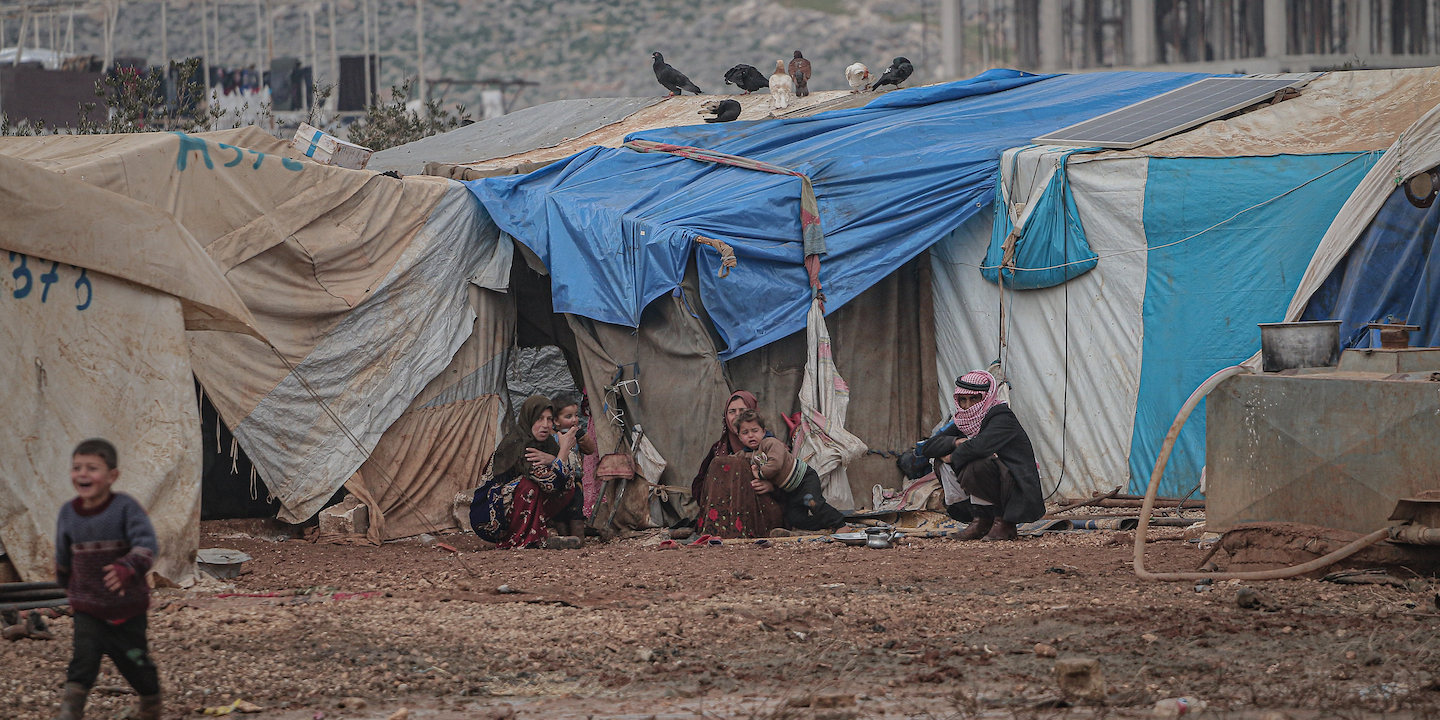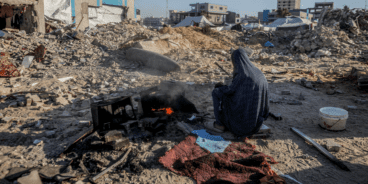

Atrocity Alert No. 192: Syria, the Sahel and China
Atrocity Alert is a weekly publication by the Global Centre for the Responsibility to Protect highlighting situations where populations are at risk of, or are enduring, mass atrocity crimes.
The “biggest humanitarian horror story of the 21st century” continues in Idlib
The humanitarian crisis in northwest Syria has reached horrifying new levels as the military offensive by government troops and Russian warplanes continues. Recent airstrikes have targeted displacement settlements, schools and medical facilities. The UN Office of the High Commissioner for Human Rights reported that the number of attacks on civilian objects suggests they can not all be accidental and could amount to war crimes. During January more than 50 health facilities in Idlib were forced to suspend work due to bombardment or evacuation and the Union of Medical Care and Relief Organizations reported that on 25 February at least 10 schools and the Idlib Central Hospital were targeted, killing more than 20 civilians.
Over 900,000 Syrians have been displaced in the past three months alone. Before the escalation of fighting in December 2019, displacement camps in northern Idlib were already five times over capacity. Now, hundreds of thousands of civilians are stranded with little food and are sleeping outside in sub-zero temperatures. UN High Commissioner for Human Rights Michelle Bachelet expressed horror at the scale of the crisis in northwest Syria, saying it was “cruel beyond belief that civilians living under scraps of plastic sheeting and in freezing conditions are being bombed. How can anyone justify carrying out such indiscriminate and inhumane attacks?”
Since April 2019, Syrian government and Russian forces have conducted a sustained bombing campaign to wrest control of northwest Syria from Hayat Tahrir al-Sham, the National Front for Liberation and other non-state armed groups. The Syrian government has also regained control of the strategic M5 highway linking Damascus with Aleppo and has reconquered most of Aleppo province. Entire towns have been razed and over 300 civilians have been killed since January.
Despite the grave situation facing civilians in Idlib, the UN Security Council (UNSC) has been unable to adopt a resolution calling on the parties to end all violations of International Humanitarian Law (IHL), because Russia has consistently vetoed or blocked diplomatic efforts. On 17 February UN Under Secretary-General for Humanitarian Affairs Mark Lowcock said, “The biggest humanitarian horror story of the 21st century will only be avoided if Security Council members, and those with influence, overcome individual interests and put a collective stake in humanity first.” Two days later Russia rejected a UNSC Press Statement drafted by France, preventing the Council from collectively commenting on the desperate situation facing civilians in Idlib.
The international community must urge parties to the conflict to halt attacks on civilians, uphold IHL and ensure that atrocity crimes do not go unpunished. The UN Secretary-General and/or representatives of the UNSC should travel to Idlib and call for an immediate ceasefire.
Ongoing violence in Burkina Faso and Mali causes mass displacement
On 16 February a group of armed men attacked a church in the village of Pansi, Burkina Faso, killing 24 people, including the local pastor, and kidnapping several others. The attack was the latest in a rising number of massacres targeting civilians in northern Burkina Faso – particularly Christian worshippers and those affiliated with the government. Last Friday, 21 February, the UN Refugee Agency (UNHCR) reported that the violence has displaced an estimated 4,000 people per day since January, resulting in 150,000 newly displaced civilians. UNHCR spokesperson, Andrej Mahecic, warned that “people fleeing the violence report attacks on their villages by militant groups, killing, raping, pillaging. Terrified of these attacks, residents have left everything behind to find safety.”
Similar violence continues across the border in central Mali, where more than 30 people were killed and 20 went missing on 14 February following a raid on Ogossagou, a predominantly Fulani village in the Mopti region. Armed men reportedly opened fire on civilians, burned civilian infrastructure and stole cattle. Local government officials reported that one day prior to the attack Malian armed forces, who had been providing security for the village, withdrew from their post. Almost a year earlier, in March 2019, more than 150 people were massacred in Ogossagou by suspected fighters from the Dogon ethnic group.
Over the past year civilians in the Sahel – particularly in central Mali and neighboring parts of Burkina Faso – have endured increasing attacks by terrorist groups as well as inter-communal violence perpetrated by armed “self-defense groups.” According to UNHCR, the violence has forced more than 700,000 people to flee their homes in Burkina Faso over the past 12 months, contributing to a more than 12-fold increase in internal displacement. Despite efforts by local governments and various international forces to confront armed extremist groups in the Sahel, atrocities continue.
The international community must provide urgent logistical assistance to the Malian and Burkinabè governments to strengthen their capacity to protect civilians. While countering violent extremism remains crucial for countries in the Sahel, it is essential that governments in the region and international forces ensure that their efforts do not further exacerbate inter-communal tensions and are undertaken in strict compliance with International Humanitarian Law. International donors should also support efforts by UNHCR and other humanitarian agencies to provide shelter, resources and psychosocial support to those fleeing atrocities.
New evidence that China persecutes Uighurs for practicing their religion
On 17 February The Associated Press published evidence from a newly obtained database, revealing more details about the mass detention program in the Xinjiang Uighur Autonomous Region (XUAR) of China, where approximately one million Uighurs and other Muslim minorities are being held in internment camps. The database contains profiles of over 300 detained individuals from Karakax County, XUAR.
The findings demonstrate that the Chinese government focused on religious practice as one of the main reasons for detention, not “extremism” as the authorities have consistently claimed. The profiles provide detailed information about why individuals were detained, including ordinary acts of religious devotion, such as fasting during Ramadan, growing a beard or wearing a veil, while others were detained for simply “having too many children.” Other reasons listed for internment in the camps included “minor religious infection” and “untrustworthy persons born in a certain decade,” which appeared to target men between the ages of 25 to 29.
In addition to detailed profiles of those in detention, the database lists information on more than 2,000 of their relatives, friends and neighbors. Family size, religious background and ties to other individuals already in detention appeared to play a significant role in decision making. In particular, people with relatives in detention are more likely to end up in camps themselves. The profiles reveal that officials also targeted people for going abroad (especially to predominantly Muslim countries) or simply for having relatives overseas. Even installing “foreign” software was considered suspicious.
The leaked data adds to a growing body of evidence that the XUAR authorities are systematically punishing ethnic Uighurs simply for practicing their Muslim faith. Article 18 of the Universal Declaration of Human Rights enshrines “the right to freedom of thought, conscience and religion” for all human beings. This includes the freedom, “either alone or in community with others and in public or private, to manifest his religion or belief in teaching, practice, worship and observance.”
The large-scale detention and widespread persecution of the Uighur population in Xinjiang could constitute crimes against humanity under international law.
All UN member states, but especially influential members of the Organization of Islamic Cooperation, should call for unfettered access to Xinjiang for the UN Office of the High Commissioner for Human Rights. The Chinese authorities must end the systematic persecution and arbitrary mass detention of ethnic Uighurs and other Muslim minorities in XUAR.
Related Content


11th Meeting of the Global Network of R2P Focal Points Outcome Document
